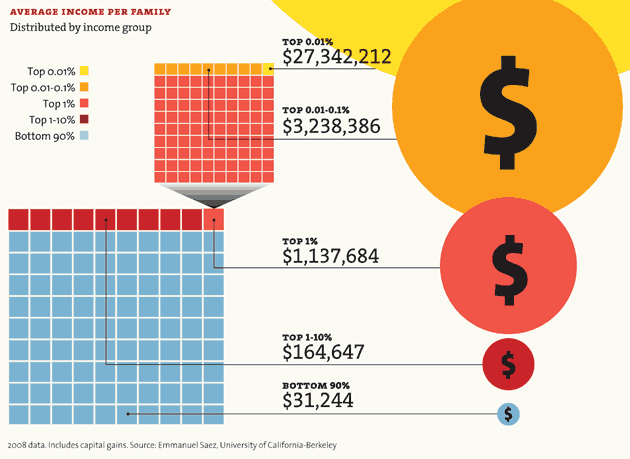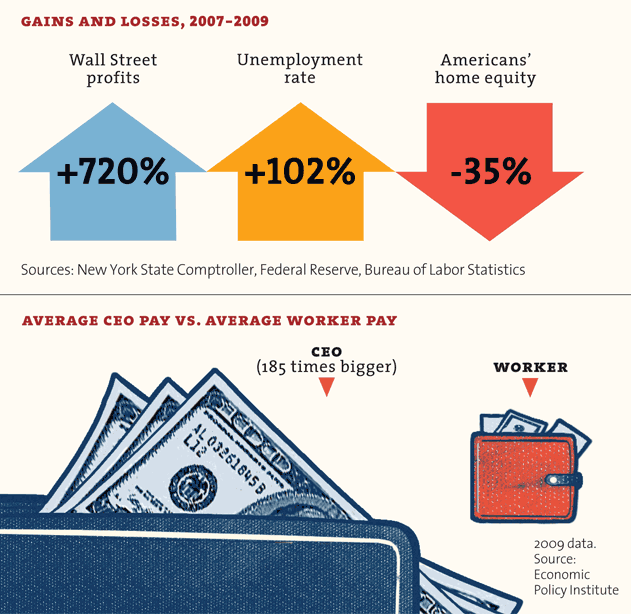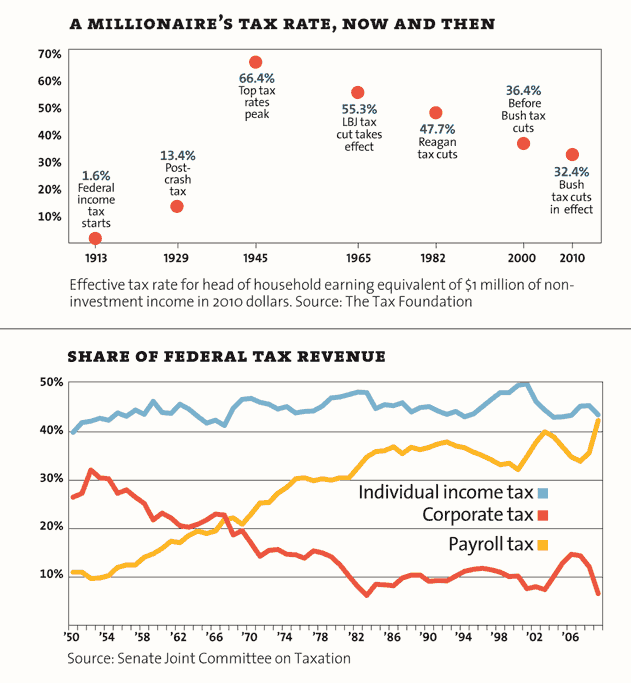Eleven charts that explain everything that's wrong with America. — By Dave Gilson and Carolyn Perot Congressional data from 2009. Family net worth data from 2007. Sources: Center for Responsive Politics; US Census; Edward Wolff, Bard College. Sources Income distribution: Emmanuel Saez (PDF) Net worth: Edward Wolff (PDF) Household income/income share: Congressional Budget Office Real vs. desired distribution of wealth: Michael I. Norton and Dan Ariely (PDF) Net worth of Americans vs. Congress: Federal Reserve (average); Center for Responsive Politics(Congress) Your chances of being a millionaire: Calculation based on data from Wolff (PDF); US Census (household and population data) Member of Congress' chances: Center for Responsive Politics Wealthiest members of Congress: Center for Responsive Politics Tax cut votes: New York Times (Senate; House) Wall street profits, 2007-2009: New York State Comptroller (PDF) Unemployment rate, 2007-2009: Bureau of Labor Statistics Home equity, 2007-2009: Federal Reserve, Flow of Funds data, 1995-2004 and 2005-2009 (PDFs) CEO vs. worker pay: Economic Policy Institute Historic tax rates: Calculations based on data from The Tax Foundation Federal tax revenue: Joint Committee on Taxation (PDF) More Mother Jones charty goodness: How the rich get richer; how the poor get poorer;who owns Congress? Dave Gilson is a senior editor at Mother Jones. For more of his stories, click here. Get Dave Gilson's RSS feed.It's the Inequality, Stupid
 Illustrations by Jason Schneider
Illustrations by Jason SchneiderA huge share of the nation's economic growth over the past 30 years has gone to the top one-hundredth of one percent, who now make an average of $27 million per household. The average income for the bottom 90 percent of us? $31,244.


Note: The 2007 data (the most current) doesn't reflect the impact of the housing market crash. In 2007, the bottom 60% of Americans had 65% of their net worth tied up in their homes. The top 1%, in contrast, had just 10%. The housing crisis has no doubt further swelled the share of total net worth held by the superrich.
The superrich have grabbed the bulk of the past three decades' gains.

A Harvard business prof and a behavioral economist recently asked more than 5,000 Americans how they thought wealth is distributed in the United States. Most thought that it's more balanced than it actually is. Asked to choose their ideal distribution of wealth, 92% picked one that was even more equitable.

Why Washington is closer to Wall Street than Main Street.

Rep. Darrell Issa (R-Calif.) $451.1 million Rep. Jane Harman (D-Calif.) $435.4 million Rep. Vern Buchanan (R-Fla.) $366.2 million Sen. John Kerry (D-Mass.) $294.9 million Rep. Jared Polis (D-Colo.) $285.1 million Sen. Mark Warner (D-Va.) $283.1 million Sen. Herb Kohl (D-Wisc.) $231.2 million Rep. Michael McCaul (R-Texas) $201.5 million Sen. Jay Rockefeller (D-W.Va.) $136.2 million Sen. Dianne Feinstein (D-Calif.) $108.1 million 

For a healthy few, it's getting better all the time.


How much income have you given up for the top 1 percent?
Plutocracy Now: What Wisconsin Is Really About
Michael Dell: The Making of an American Oligarch
How the Oligarchs Took America
Quotes of the Day: Pitchforks and Plutocrats
A Simple Look At Income Inequality
![[Most Recent Quotes from www.kitco.com]](http://www.weblinks247.com/indexes/gfms.gif)
![[Most Recent Quotes from www.kitco.com]](http://www.kitconet.com/charts/metals/base/spot-copper-30d.gif)
![[Most Recent Quotes from www.kitco.com]](http://www.kitconet.com/charts/metals/base/zinc-d.gif)
![[Most Recent Quotes from www.kitco.com]](http://www.kitconet.com/charts/metals/base/lead-d.gif)
![[Most Recent Quotes from www.kitco.com]](http://www.kitconet.com/charts/metals/base/spot-nickel-30d.gif)





































